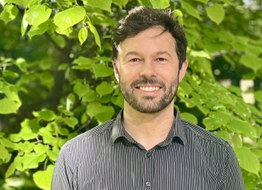Prof. Dr. Philipp Kanske
 © Anja Pixa
© Anja Pixa
Prof. Dr. Philipp Kanske
Eine verschlüsselte E-Mail über das SecureMail-Portal versenden (nur für TUD-externe Personen).
Besuchsadresse:
Chair for Clinical Psychology and Behavioral Neuroscience, Room 365 Chemnitzer Str. 46
01187 Dresden
RESEARCH STATEMENT
Deficits in social interaction are a central issue across many mental disorders. My overarching research goals are (1) to describe the interactive, emotional and cognitive mechanisms that underlie these deficits and (2) to specify their role in the etiology of different psychopathologies, (3) to enable earlier diagnostics and targeted psychotherapy. To this end, I work with behavioral (experimental psychology, ecological momentary assessment) and peripheral physiological methods, as well as with electroencephalography and functional magnetic resonance imaging.
SCIENTIFIC EDUCATION
|
2014 |
Habilitation at Heidelberg University |
|
2011 |
Licensed Psychotherapist |
|
2008 |
Dr. rer. nat. at the University of Leipzig |
|
2005 |
Dipl.-Psych. at Technische Universität Dresden |
|
2004 |
M.Sc. at the University of Oregon, USA |
PROFESSIONAL EXPERIENCE
|
since 2017 |
Professor for Clinical Psychology and Behavioral Neuroscience, Technische Universität Dresden |
|
2012 – 2017 |
Group Leader „Psychopathology of the Social Brain” at the Department of Social Neuroscience, Max Planck Institute for Human Cognitive and Brain Sciences, Leipzig |
|
2011 – 2012 |
Research staff at Heidelberg University, Department of Psychiatry, Section of Experimental Psychopathology and Neuroimaging, Heidelberg |
|
2009 – 2011 |
PostDoc at the Central Institute of Mental Health, Institute of Cognitive and Clinical Neuroscience, Mannheim |
OTHER SCIENTIFIC ACTIVITIES, HONORS, AWARDS
|
2017 |
Heinz Maier-Leibnitz Award of the German Research Foundation |
|
2015 |
Member of the Young Academy at the German National Academy of Sciences Leopoldina and the Berlin-Brandenburg Academy of Sciences and Humanities |
|
2013 |
Lilly Young Investigator Fellowship in Bipolar Disorder at the International Conference on Bipolar Disorder |
|
2013 |
Young Investigator Award of the European Brain and Behaviour Society |
|
2013 |
„Rising Star” of the Association for Psychological Science |
|
2012 |
Young Investigator Award of the German Society for Psychophysiology and its Application |
|
2008 |
Otto Hahn Medal of the Max Planck Society |
|
2006 |
Werner Straub Award of the Department of Psychology at Technische Universität Dresden |
SELECTED PUBLICATIONS
Trautwein, F. M., Singer, T., & Kanske, P. (2016). Stimulus-driven reorienting impairs executive control of attention: Evidence for a common bottleneck in anterior insula. Cerebral Cortex, 26(11), 4136-4147.
Kanske, P., Böckler, A., Trautwein, F. M., Parianen Lesemann, F. H., & Singer, T. (2016). Are strong empathizers better mentalizers? Evidence for independence and interaction between the routes of social cognition. Social Cognitive and Affective Neuroscience, 11(9), 1383-1392.
Kanske, P., Böckler, A., Trautwein, F. M., & Singer, T. (2015). Dissecting the social brain: Introducing the EmpaToM to reveal distinct neural networks and brain–behavior relations for empathy and Theory of Mind. Neuroimage, 122, 6-19.
Kanske, P., Heissler, J., Schönfelder, S., Forneck, J., & Wessa, M. (2013). Neural correlates of emotional distractibility in bipolar disorder patients, unaffected relatives, and individuals with hypomanic personality. American Journal of Psychiatry, 170(12), 1487-1496.
Kanske, P., & Kotz, S. A. (2011). Emotion triggers executive attention: anterior cingulate cortex and amygdala responses to emotional words in a conflict task. Human Brain Mapping, 32(2), 198-208.
For a complete list of publications, please see
